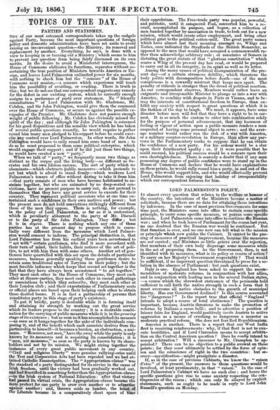LORD PALMERSTON'S POLICY.
IN almost every question that relates to the welfare or honour of the country, the intentions of the Ministers become a matter of solicitude, because there are no data for attaining those intentions by inference. In the case of most previous Governments for some time past, the Ministers came into office to sustain some specific principle, to carry some specific measure, or pursue some specific mission. Lord Palmerston came into office to continue iihe Russian. war; and when he took leave of Parliament for the recess last year, no one doubted that the Russian war would be continued. But that function is over, and no one now can tell what -is the mission
or principle -labia now guides the Cabinet. cannot be the pas- sing of measures of practical improvement, because the measures are not earned; and Ministers so little grieve over the rejection, that members of their own body disparage some measures while in the act of proposing them. As the Government, then, is not identified with its measures, what is its policy or course of action? To carry on her Majesty's Government respectably? That would be sufficient, if no important question threatened to press for a so- lution in the absence of Parliament':' but such qnestions exist.
Italy is one. England has been. asked to support the recom- mendation of moderate reforms, in oonjunction with her allies, and in conjunction with leading then in the several Italian states, —a course which the shrewdest statesmen of the peninsula hold sufficient to call forth the native strength in such a form that it must overcome all native obstacles to the growth of municipal liberty. Has our Government declined? Is this course accounted too dangerous ? " Is the report true that official " England " intends to adopt a course of total abstinence ? The question is important, because Austria threatens to make the promotion of reforms by Italians a easus belli ; and to advertise a position of laissez faire for England, would positively invite Austria to active aggression as a means of crashing so dangerous a monster as moderate practical reform. She does not fear Red Republicanism'. America is another. There is a report that our West India fleet is receiving reinforcements-: why, if that fleet is not to exe- cute hostilities and if Lord Clarendon means to accept arbititi- tion on the Central American question? Does he really intend to accept arbitration? Will a successor to Mr. Crampton be ap- pointed? There can be no objection to a public avowal on these points for they must ultimately be settled by the force of opin- ion and the conscience of right in the two countries : but se- crecy—mystification—might precipitate a disaster.
If, as in the case of previous Cabinets, we knew the "raison d'etre " of the present, the answers to these questions would be involved, at least proximately, in that "raison." In the ease of Lord Palinerston's Cabinet we have no such clue ; and hence the specific questions give rise to some anxiety respecting the eon- tmgencies of the recess ; which can onlybe allayed by explicit statements, such as ought to be made in reply to Lord John Russell's question on Monday.


























 Previous page
Previous page